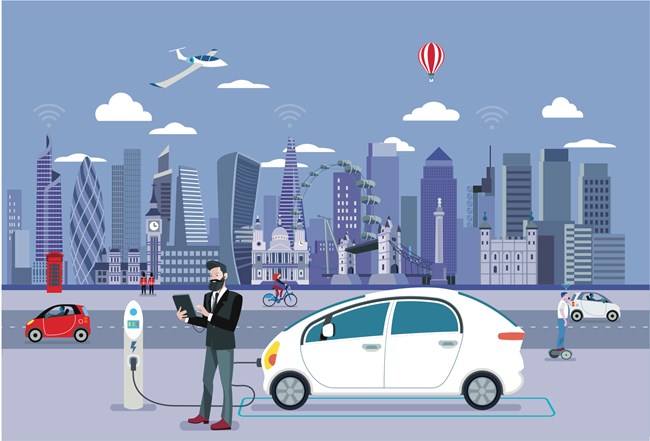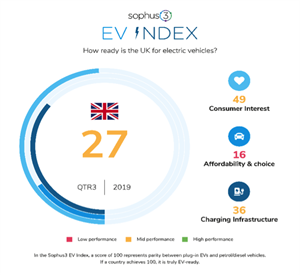
The start point for the best source of fleet information |
New insight into consumer demand for EVs
Date: 10 February 2020 | Author: Sean Keywood

Fleet incentives could help the UK gain ground on the adoption of electric vehicles (EVs) compared with the leading countries in Europe.
That is according to Scott Gairns, managing director of automotive data firm Sophus3, which has produced new analysis of national EV readiness.
The EV Index assigns a rating to five major European car-buying countries - France, Germany, Italy, Spain and the UK - along with EV pioneer Norway, based on how close EVs are in that country to parity with internal combustion engines.
This is calculated from individual ratings for consumer interest, affordability and choice, and charging infrastructure, with a 100 rating representing parity.
The index gives the UK a score of 27, behind Norway on 43 and Germany on 28, but ahead of France on 25, Spain on 13 and Italy on six.
Sophus3's report on its findings states that government initiatives are needed to drive EV adoption, and Gairns believes fleets are a good target for these - with the introduction of a 0% BIK company car tax rate for zero-emission vehicles from April this year a good step.
Citing Sophus3's tracking data from manufacturer websites, he said: "We have noticed on OEM fleet sections that since the announcement of the 0% BIK rate there has been a significant increase in interest in EVs.
"We think this year the increase in EV sales will be much greater for fleets than in personal cars. As soon as companies start buying big chunks of EVs, it will also have a positive impact for consumers."
When asked what the UK should do to catch up with Norway, Gairns said chargers and consistent policy should be the major focus.
"I think it is mostly charging infrastructure," he said. "We are starting finally to see fast charging stations rolled out, but mostly through private companies.
"Norway has been successful because of consistent incentives over time, which we need to see from the UK Government.
"I think consumers are sceptical because the government makes a different announcement every six months, so they are delaying purchases until they see a consistent approach."
Sophus3's research suggests there was a 126% increase in EV interest in the UK in the third quarter of 2019, but Gairns does fear that vehicle supply may hinder turning this interest into sales.
"I think potentially supply could become an issue this year, because a lot of OEMs are starting to produce EVs, but not large volumes, and I think 2020 could be the year of starting to see mass adoption," he said.
"More models will mean consumers see EVs as less marginal and less niche, so there will be less risk buying them, but at the same time [manufacturers] are trying to get rid of petrol and diesel cars.
"I think we could see a lot of [electric] cars come out but not significant volumes, potentially creating frustration with the time between ordering and delivery."
Gairns also warned that the continued boom in sales of SUVs - typically more polluting that traditional car market segments - could negate
any environmental gains achieved through electrification.
He said: "We see at the moment a bit of a hypocrisy in [governments] trying to recommend electrification and not saying anything about SUVs, which tend to consume far more than ordinary cars.
"I would suggest the government try to promote EVs and reduce the incentive to buy SUVs. Otherwise EVs won't offset SUV sales."










